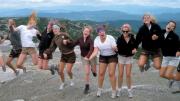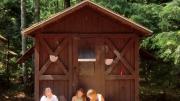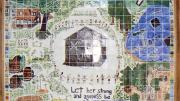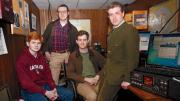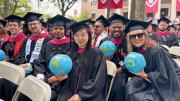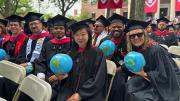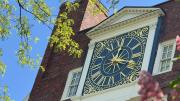As our car sped away from Logan Airport, into Boston and out along the Charles, my eyes widened as the cupolas of Harvard came into view. “Do I really go there?” I mused aloud. At that moment, I couldn’t have felt farther away from being a Harvard student: an independent college kid living in a city, studying and sailing, hanging out with other kids but operating on my own terms, only as connected to others as I chose to be. I was in a different mode altogether.
That day, my mum and I were just passing through Boston, dropping off one of my fellow camp counselors at the airport before heading home for the final week of summer. Soon I would be returning to Harvard for fall semester, but for now, I could reflect from afar. Venturing away from the quiet lakes region of New Hampshire for the first time in two months, everything ordinary struck me as foreign: highways, billboards, tall buildings, masses of people. But these outward differences seemed trivial as I began contrasting the atmosphere of my small summer camp with that of the real world—and, more pressingly, with my memory of freshman year at Harvard.
I’ve spent nearly every summer of the past 10 years at Camp Onaway. From a gawky, quiet 10-year-old to a grown-up, goofy first-year counselor, Onaway has been my haven. Camp is fun, silly, carefree; active, outdoorsy, and nature-loving; above all, traditional. Think The Parent Trap, but more Hayley Mills than Lindsay Lohan. Each summer, 120 campers and counselors, aged 10 to 25, join our motherly director, Mrs. Conolly, for seven weeks of swimming, sailing, hiking, and simple living up in the woods. Uniform checked or striped shirts are tucked in at all times, cabins are inspected daily, songs are sung at every opportunity, and we gather for a nondenominational chapel service in our lakeside, birch-lined grove every Sunday evening. To most, we Onaway girls sound crazy! But that wouldn’t be giving camp a chance.
Our common camp refrain is: “You can’t get Onaway unless you spend a summer there.” It’s hard to understand that even though camp requires you to change yourself to fit its mold, that change is, first, more about character than looks, and, second, inevitably positive. The Onaway girls arrive in June looking like standard twenty-first-century kids—individuals, of course, but all bearing the same objects of modern America. Once arrived, though, we relinquish cell phones, tuck away street clothes, say goodbye to the Internet, and, most importantly, leave behind the petty competitions over looks, possessions, and status that plague our real-world lives. In the resulting void we plant friendship, community, and frank discussion of honor, values, and character. Rejecting the trappings of modern life, at least for the summer, allows us to embrace a different ethos. And though this camp culture shows itself in awkward uniforms, ridiculous songs, and seemingly rigid rules, these traditions no more embody camp than red-brick edifices and leather book bindings embody Harvard. The traditions bring Onaway campers onto one plane so that we can develop the intangible qualities of a strong community.
Camp is community; community is camp. Onaway takes girls from different backgrounds, with different attitudes, and assimilates them into a family in which trust, honor, and care for others are paramount. Though it may take years to understand the power of this type of community, once it clicks, you never forget it: you are never content to sit back, to do less than you can, to lie or cheat or shirk. And we love camp for this: in our diverse, doctrine-shy world, one hardly ever encounters a community in which everyone agrees, implicitly, about the right way to behave. Nowhere else I know has values that are so clearly defined, nowhere is there such agreement about the proper manner of treating other people. At camp we learn to sail, swim and knit, to build a birdhouse and paddle a canoe, but all the while we are learning how to be, and that’s what’s most important.
Returning from camp is always a shock. Though we are eager to reacquaint ourselves with electronics, indoor plumbing, and boys, we regain these missing pieces of normal life at at deep cost. We may have the modern world back, but we’ve left behind our Onaway community. I sensed this trade-off most acutely as I passed Harvard only hours after leaving New Hampshire. I was excited to be returning soon to Cambridge—to my friends, my classes, my sailing team, and to life in the city—but I was more conscious of my sadness in leaving my summer community.
At camp, I’m now one of the grown-ups: the girls look up to “Miss Is” to guide them. At school, I’m still a kid: professors and advisers give assignments and directions to me as their student. At camp, I’m expected to help out, to work with others, to make sure life runs smoothly for everyone around me. At school, I’m expected to strive and achieve independently, to prioritize my success in some abstract quest to serve the world in the future. At camp, I show my worth through kind words, good advice, and uncomplaining aid. At school, I show my worth through well-tuned writing, well-reasoned exams, and thoughtful contributions to discussions. In short, both Harvard and Onaway have high expectations, but their focuses are different.
So why, I asked myself, did returning to college make me feel as though I was regressing? It just didn’t seem right that I would soon be more focused on earning myself a good grade than on ensuring that my campers behaved kindly to each other. It seemed wrong that tutors might be scolding me for making too much noise or leaving inconsiderate messes, instead of my being responsible for teaching campers to respect rest hour and keep their cabins neat. All summer, camp reminded me to be considerate, kind, and generous, and I, in turn, reminded my campers to do so. Now I was returning to a place where these ideals were never talked about. Finally, I realized why my most recent drive through Cambridge felt so melancholy…
Never in my first two semesters at Harvard had I ever heard someone talking about values. Maybe individuals were thinking about right and wrong, honor and duty, but they never brought those ideas up. I never sensed that the members of Harvard’s community shared a common idea about how to behave kindly and courteously to one another. And the thing is—without this sort of discussion, a community forgets simple rules of behavior. When no one talks about responsibility, people leave trash in the hall for maintenance staff to deal with. When no one talks about consideration, people push through doors without looking to see if anyone’s following. When no one talks about generosity, people forget that it is more important to help a friend than to finish a problem set. I’m not excusing myself from this sort of behavior (no one’s perfect—certainly not I), but I know these breaches of consideration happen here, and I feel certain that, were values talked about, we would all behave better.
Apparently, others at Harvard have been thinking along the same lines. I returned to campus in September to news of a new Freshman Pledge, which all the members of the class of 2015 were asked to sign. The pledge reminds students that, at graduation, they will be expected to be ready to “advance knowledge, to promote understanding, and to serve society.” It further asks that students agree to “act with integrity, respect, and industry, and to sustain a community characterized by inclusiveness and civility” throughout their years at Harvard. Surprisingly—at least to me—this initiative drew quite a bit of ire, particularly from members of the community who saw the public nature of the pledge (the signed pledges were to be posted in freshmen entryways) as infringing on students’ freedom. (For more coverage, see harvardmag.com/convocation-2015.) But arguments about freedom and the idea of a public display aside, it seems an overwhelmingly positive move to re-open the discussion of values at Harvard.
I’ve come back from camp to college believing firmly in the power of a community that embraces virtue even as its members have fun and work toward common and individual goals. I hope the instigation of the Freshman Pledge encourages more voices to speak out about the importance of collaboration, respect, kindness, and humility here. If they do, we will find the Harvard community rallying around these values. Imagine if, instead of seeing ourselves as the smartest kids of America, we humbled ourselves as the luckiest; imagine if, instead of dreaming of personal success, we eagerly anticipated using our talents to serve the world; imagine if we went around saying, “How can I help you?” and “What needs to be done around here?” instead of “These are my personal goals,” and “This is what I have to do.”
Our school is full of kind, generous, unselfish individuals. But what if we could make the spirit of these individuals universal? If we talk about how we want to behave, sooner or later, the community will embody that behavior. We should make the common image of a Harvard student not a smart, entitled self-promoter but rather a generous, humble leader. We are capable of creating community where this standard is the norm. I know it. I’ve watched my Onaway girls figure it out, and I think my Harvard classmates can, too.
